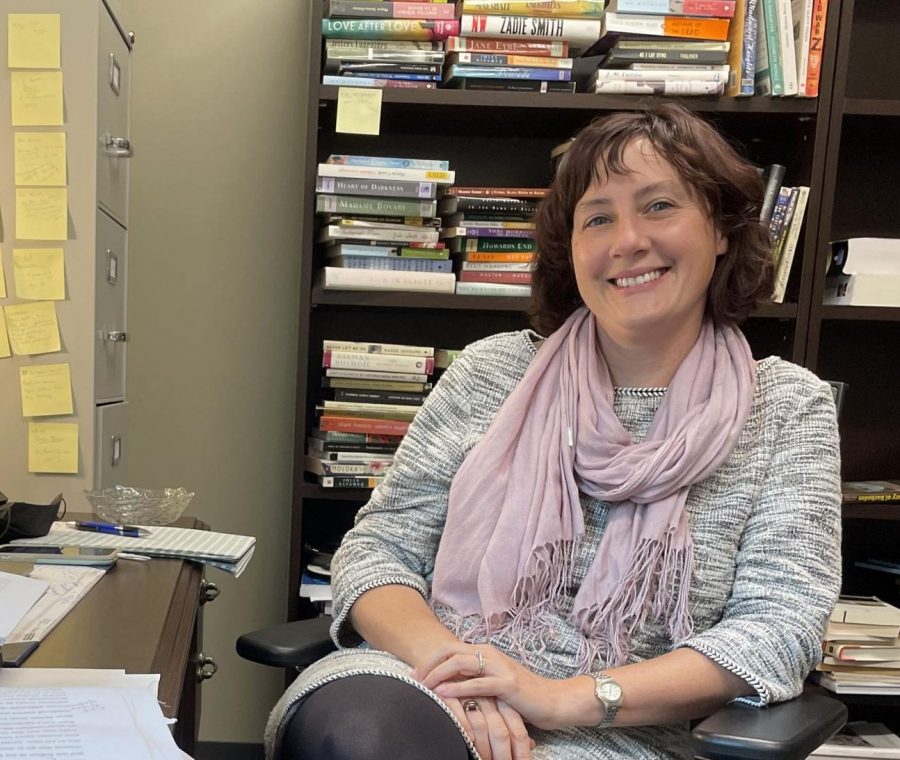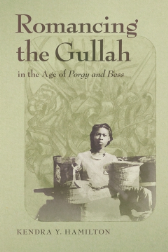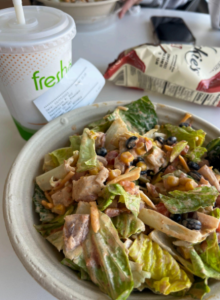3 languages, 2 countries, 1 story
The fantastic life of Dr. Emily Taylor: mother, educator and life-long learner
September 20, 2021
In Germany during the fall of the Berlin Wall, in the air during 9/11, in Barbados during her graduate study—a winding path to Presbyterian College.
The year is 1989. In the United States, the Cold War has Americans paralyzed in a state of worry, as East Germany and West Germany enter negotiations to open their borders and allow free access for the first time since WWII.
The day is Nov. 9. Hearing the news of an agreement, citizens of both nations have streamed to the Berlin Wall, the physical manifestation of that separation, shouting “Tor auf!” (“Open the gate!”). As cranes and bulldozers tackle larger sections, individuals use whatever tools they can find to attack the symbol of division. Almost overnight, it seems, the Berlin Wall has fallen.
Seven hundred kilometers away, Emily Taylor sits in a fifth-grade classroom at a military base in Traben Trarbach, Germany, examining with her classmates bricks from the collapsed Berlin Wall. Her young eyes have not fully absorbed the significance of the moment, but what is to become a perpetual interest in all things foreign is piqued. Those crumbling bricks from the demolished wall will become the foundation of a long path of inquiry into the unfamiliar—a chronic thirst for knowledge.
***
Dr. Emily Taylor opens the door in her quaintly decorated office in Presbyterian College’s Neville Hall. Natural light from the windows looking out onto Laurens Hall cast a warm glow on her many diplomas, and the shelves are lined with books and personal photos – her smile is my invitation to feel at home.
“Living in Germany may have been the thing that shaped me the most,” Taylor says, explaining that she spent much of her youth outside of the United States due to her father’s status as an English citizen serving in the Royal Air Force and later the U.S. Air Force. Taylor has dual citizenship, and from 1987 to 1990 she called Hahn Air Force Base in Germany home.
What was the impact of living in such a faraway place? “At a young age, I was really independent,” she said. “I would walk from our apartment down to the train station where the bus would pick me up and take me to the American base to go to school. I’d go to the grocery store for my mom. (I) took gymnastics and horseback riding, took lessons in German—my best friend was bilingual–I didn’t really feel American when we came back to the States when I was ten.”
Arriving with her family in Nebraska in 1990 was quite a culture shock, Taylor admits. Despite the pressure to adjust to her new environment, Taylor treasured her bicultural experiences.
In high school, she sought to connect with her bicultural identity and found the poetry of Pablo Neruda. Taylor’s admiration for him grew and she studied Spanish in college to read his work it its native language. Declaring a double major in English and Spanish at the University of Northern Iowa, Taylor leapt at the chance to study abroad and scratch her “itch” to travel once again.
“I went to Northern Spain for a semester, to a town called Oviedo,” Taylor explained. “That’s where I became bilingual in English and in Spanish. Similar to being an American kid in Germany, being an English speaker in Spain led to my ego taking a hit, and I think that was really good for me…having to learn a new language was sort of like learning a new sense of self and a new way of expressing myself,” Taylor said.
In undergrad she traveled to England and to Vietnam in 2000. In Vietnam, Taylor explored war sites and saw with her own eyes the damage the war inflicted on the nation. Eventually concluding the war had been “over nothing,” this trip was yet another experience that shaped her ideologies and beliefs.
After graduating from University of Northern Iowa, Taylor applied and was accepted to the comparative literature program at the University of Oregon, a school of around 20,000 students. Filled with excitement at entering such a prestigious program in a whole new culture, the culture of the Pacific Northwest city, Taylor boarded her flight.
The date was Sept. 11, 2001.
“I was in the air, flying from Omaha to Minneapolis when the first tower fell,” Taylor said. “My ex-boyfriend who lived in Minneapolis met me at the gate, … and we just grabbed my bags and left the airport.”
After traveling from Minneapolis to Portland by train due to grounded flights, a close friend of Taylor’s picked her up and helped her settle in to Eugene, the place that would be her new home for the next eleven years as she completed her Ph.D.
Taylor spent a year of her PhD program in Barbado at the University of the West Indies – a very formative experience in her life. She wrote her dissertation on Caribbean women writers and completed a certificate on women and gender studies. To complete the certificate, she had to take a feminist pedagogy class that taught about feminist teaching methods. This class deeply impacted the way that Taylor views teaching, the structure of her classes, and her teaching methodology.
In her progressive view of teaching, Taylor emphasizes the students’ role in the classroom and learning. She passionately explains how the instructor shouldn’t be seen as an authority figure, but rather as the person who facilitates learning by providing materials for the students to learn from.
“Dr. Taylor always tries to get us to question our role under authority figures,” junior Emma Bradley, a current student in two of Taylor’s courses, said. “She even invited us to call her Emily instead of Dr. Taylor, which is what her students in Oregon would call her. She always invites conversation and consideration on the role we all have in the classroom.”
It was also during this time that she met her first husband, a man who she said gave her a sense of security following the uncertainty and trauma of September 11, sporting a 1970 Dodge pickup truck, a background in hunting and fly fishing, and a vast collection of guns. Nearing the completion of her PhD, she realized they were no longer a good match. While this was definitely a drastic change in her life, she offered up a more appreciative reflection of this end.
“That was kind of the first time that I was single and living on my own and on my own terms,” Taylor said. “It was really lonely but also really wonderful to have that ability to determine my own life and make my own decisions.”
During her 30s, Taylor completed her PhD, was an instructor at both the University of Oregon and Willamette University, began working at Presbyterian College, and met her current husband, Steven, who she now has two children with. Her greatest accomplishment to date is being a parent to her children, Alex and Ellie. However, parenting is no walk in the park, and Taylor is not exempt from the difficulties that come with parenthood.
Being a parent in any profession is hard, but even more so in the profession of teaching – work often spills over into their home life. Childcare requires a lot of time and energy, something that professors already tend to run short on, giving their students much of these things throughout their time on campus – distributing this energy can be difficult.
Despite the challenges, though, she is extremely happy to be a parent. The benefits outweigh the costs, and she recognizes that parenthood has transformed her view of teaching in some ways.
“It’s really intense and stressful right now, I won’t lie… It’s really transformed how I’ve thought of myself though, because you see yourself reflected in your children’s personalities and the things they mirror back to you, so I think it has transformed how I think about my interactions with other people and the way that I teach,” Taylor said.
According to Taylor, constructive criticism and pointing out the areas that someone is performing really well in gets them excited about producing better work. Negative feedback and only pointing out the areas that a student needs to work on can often lead to discouragement and a lack of desire to complete work.
“Dr. Taylor gave constructive feedback on our papers and told us what we did well as well as what we could work on in a very helpful way,” junior Angel Cooke, one of Taylor’s previous students, said. “She encouraged us to be the best writers we could be and gently pushed us to our highest potential.”
In a way, it’s easy to see that throughout her lifetime Taylor has always been a passionate and determined person; nothing will prevent her from pursuing the things she is passionate about and making every experience a meaningful one. She’s much more than just a professor at a small liberal arts college in Clinton, South Carolina; she’s a mother, she’s bilingual, she’s the daughter of an Air Force veteran, she’s an educator as well as a student herself, and, most importantly, she’s unapologetically true to herself. We can all stand to learn a thing or two from Dr. Emily Taylor’s story.





